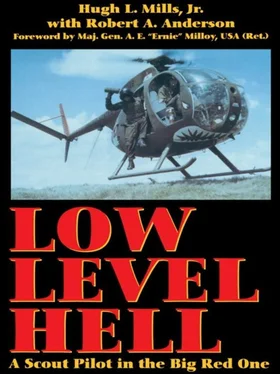As Willis’s ship sank down, hit the ground, and jolted to a stop, Rod and Stormer exploded out of the helicopter and hit the ground running toward my bird like a couple of cheetahs pursuing their evening meal! As I landed close by, both pilot and crew chief jumped into my aircraft—Rod in front with me and Ken Stormer in the back. I yanked pitch and off we went, straight out of that unfriendly jungle.
Rolling out of the clearing, I had my first chance to look at Willis closely. Rod’s face was pale and, for once, he wasn’t wearing a silly grin. As soon as he got himself strapped in and his headset connected, I keyed the intercom. “Are you OK? What in the hell happened to you back there?”
Again, I saw his lips moving, but all I heard were the now-routine hissing, gurgling, sucking noises. Willis didn’t look to me as though he’d been hit in the chest. If he had been, how could he have run the way he did, out of his ship into mine? And what about his chicken plate? I didn’t see any evidence of bullet damage to that.
Then his helmet caught my eye. I punched the intercom. “How about your head—you hit in the head? Did one of the AK rounds hit you in the head?”
He nodded his head back to me… no.
I cradled the collective on my knee and reached over to Willis with my left hand. Then I twisted my finger into a small, ragged hole in the right side of Rod’s helmet. “Son of a gun! Here I am thinking that you were all shot up and next to dead, and you haven’t even been hit!”
What had happened, I surmised, was that a round had gone up through the side of Willis’s flight helmet, splitting some of the electrical components in his headset, which caused all that sucking and hissing noise. His “gurgling chest wound” was plain old radio static.
When we got back on the ground in Phu Loi, it was interesting to observe how differently Ken Stormer and Rod Willis reacted to the harrowing experience they had just been through. Stormer jumped out of the back of the ship, a very concerned look on his face. He was obviously worried about the condition of his pilot. He was also mad because, in the couple of seconds it took him to reach for his RPD, Stormer thought his pilot and his aircraft had been hit by enemy ground fire. The only saving grace was that he himself hadn’t been hit or hurt in the forced landing.
As soon as he discovered that Willis hadn’t been hit, and that the downed OH-6 was going to be recovered from the jungle—with all his gear still in it—Stormer was a new man. He hit the hootch telling everybody what a fantastic job his lieutenant had done in landing the damaged airplane. After that, he couldn’t stop talking about what a great weapon his RPD was, always adding, “Oh, by the way, if I cut the flash suppressor off the barrel, I’ll betcha I can get at least a three-foot flame out of the end of that thing.”
Rod was a different story. He was visibly shaken by his experience—quite a departure from his usual demeanor. This time Rod wasn’t grinning. This time he was scared to death. The fact that an enemy bullet had gone through his helmet, not a fraction of an inch from his skull, didn’t bother him a bit. But the fact that he wasn’t able to control his aircraft nearly paralyzed him.
When Willis’s aircraft was recovered from the jungle and inspected by maintenance, it was found that he had taken AK rounds through the push-pull tubes and the pitch change links on the rotor head. This was what I saw flapping around near the main rotor swash plate when I nudged in close to his ship.
A pilot, in order to fly his aircraft, must have instant reaction from his control input. With the damage Willis had sustained to his controls, he suddenly discovered that he couldn’t get a nose up-down reaction when he pushed the cyclic forward and back. With a forward input of the stick, the nose, instead of going down, rolled to the right. Everything was about ninety degrees off its plane of reaction, and it took one hell of a piece of flying to keep that thing in the air. It would be like driving your car down a football field at a hundred miles an hour, with the field covered in a solid sheet of ice, then trying to turn left and stop your car at the same time.
It took a few days for Willis’s “pucker factor” to finally relax. (“Pucker factor” is best defined as the reaction to a desperate flying situation, when your butt puckers to the point of almost sucking the seat cushion right up your backside. Unless you’ve experienced it, you couldn’t really understand.)
Three days later, I had my own experience with the pucker factor. On 28 October, I was up to do an early morning VR of the Saigon River near fire support base Tennessee in the area of the Mushroom. Dean Sinor (Three One) was my gun and Jim Parker was my crew chief.
The Mushroom was a particularly hot area along the Saigon; it was a major dropping-off point for enemy troops and supplies destined for the Iron Triangle. They would hit the river up at the Razorbacks, their staging area, and bring their loaded sampans down to the western stem of the Mushroom. They’d get off the river there, march overland across the stem of the Mushroom, cross the river again on the eastern edge of the stem, then march on into the Iron T.
With the curfews we had imposed on river traffic, Charlie used the dark hours of the night and early dawn to make the trip down. As daylight broke, they’d duck into tributaries or little coves to avoid detection. They knew that anything seen on the river in daylight was fair game for our guys.
When we took off that morning, it was cool and damp. It had rained much of the night and into the early hours of the morning. The mist and fog from all that moisture hung over the river like a blanket, covering the nipa palms and elephant grass along the shoreline.
As soon as we hit the Phu Cuong bridge, I dropped down as close as I could get to the surface of the river and moved out toward FSB Tennessee. I cranked up my speed because our mission that day was not to provide hard intelligence, but to find and intercept any enemy river traffic that dared to be on the river at first light.
The flight was uneventful all the way up to the Iron Triangle. Parker, in his typical fashion, lounged in the back cabin looking unconcerned, his left hand on the M-60, and one foot cocked up underneath his armor-plated jump seat. As we neared the Iron T, I noticed that there was some artillery coming out of Lai Khe, impacting in the northeastern corner of the Triangle; it didn’t affect us as long as we stayed west of the river boundary between the 1st and 25th Divisions.
I stayed down on the Big Blue at about ninety knots, flying at about two to three feet above the river surface. Flying was exhilarating, but always with the anticipation that a target could be just around the next corner.
As we skimmed along, I spotted the telltale sign of a cooking fire up ahead. It looked as though it was coming from my left on the 25th Division side of the river, on the western side of the Mushroom stem. Charlie probably thought he could get away with a cooking fire because of the low-hanging fog, which would absorb the smoke.
His logic was OK. My gun pilot couldn’t begin to see the smoke from a cooking fire at his altitude—everything looked like one continuous gray blanket of fog. But humming along at river level, I could see that little plume of smoke curling up from about a mile away, before it had a chance to diffuse into the mist.
Not only could I see the camp-fire smoke, I could smell it. The air was thick with moisture and quick to carry the distinctive charcoal odor along, to be picked up by an aeroscout nose waiting for just such an enemy sign. Burning charcoal in Vietnam smelled just like the smoldering coals of a backyard barbecue at home. The only difference was the kind of food Charlie was cooking. So, from almost a mile away, I knew that we had bad people.
Читать дальше












